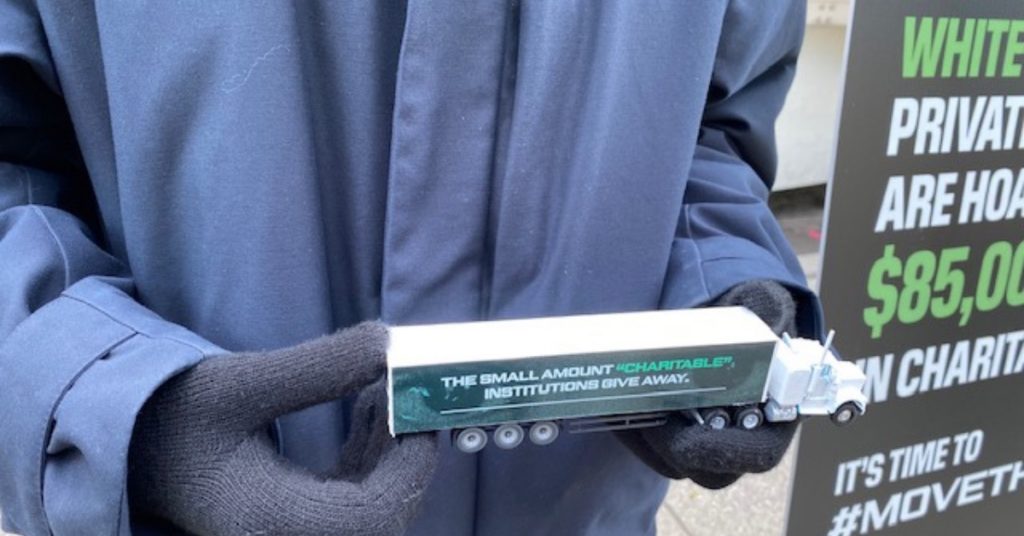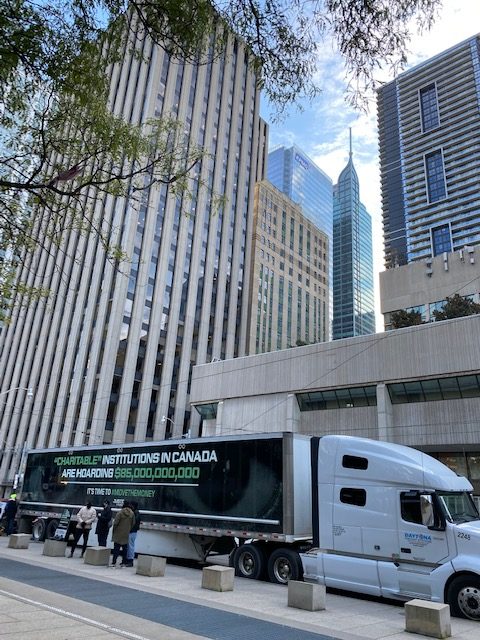(November 4, 2021) Justice Fund Toronto made its position on philanthropic reform clear today as it pulled an 18-wheeler up in front of Toronto City Hall with the unmistakable message “Charitable” Institutions in Canada are Hoarding $85,000,000,000 festooned on its big-rig side, and parked it there for the entire day. The word charitable was in quotation marks. The direct action campaign called #movethemoney comes as loud calls are being made for a significant increase in the charitable foundation disbursement quota (DQ) and well-known philanthropist and social entrepreneur Bill Young is advocating for charitable foundation investment earnings to be taxed if they are not invested in social impact. All this in the midst of revelations that Deputy Finance Minister Michael Sabia is recused from advising Finance Minister Chrystia Freeland on anything to do with charities because he sits on the board of The MasterCard Foundation, Canada’s largest private foundation and, as such, the country’s biggest beneficiary of a low DQ.
Yet, rays of light are beginning to hit the soft underbelly of the previously opaque workings of Canadian foundation philanthropy and Justice Fund Toronto, which runs community programs in the city, is betting that once Canadians know what’s going on, they won’t like it one bit. Today’s Toronto City Hall action is only the beginning of a #movethemoney campaign that will include capacity building events and workshops on how the charity tax credit system is working in Canada, how it contributes to inequity and how reform is needed, as well as community action like we saw today. And it is a movement being led by the communities who have received the short end of the philanthropic stick, and the instigators believe it’s a movement that will ripple across the country.
“We are going to break the information down and make it digestible for people to understand,” says Jermyn Creed, co-founder and director of community engagement for Justice Fund. He says people are working very hard to support their communities, but they’re not getting the resources they need. They are reluctant to criticize foundations because they’re afraid to bite the hand that feeds them.
“This should not be happening, right? If we’re seeing injustice, and it’s coming from donors or funders, we should be able to speak up about that. But when people are saying ‘I’m too scared’, that tells us there’s an issue with what’s going on. It’s not fair, and it’s not equitable,” says Creed. “But Justice Fund is not afraid to have these conversations because we are speaking for the people. We’re speaking for the community. I’m speaking as a person who used to be a frontline worker.”
Creed says it makes no sense that these foundations want to be around forever. “If someone wants to be remembered for one hundred years, if that’s what you really want, then give away your money and ask for a place to put a statue of yourself. Because if that’s what you’re after, it’s not about communities. It’s not about the city. It’s not about the country, it’s about your ego.”
Justice Fund thinks the problem “with a lot of these people is that they don’t understand the younger generation will not be standing for this. Young people we talk to don’t understand why $85 billion is sitting in a bank when there’s homelessness within Toronto. We’re not letting the government off the hook, but this is money that you can easily hand over to communities. And, says Jermyn Creed, “it would even make taxpayers smile.”
Ultimately, Justice Fund believes “the exploitation of Canadian tax law has allowed Charitable foundations to hoard over $85 billion dollars in charitable assets. If distributed, this money would create transformative change in providing security and proper access to opportunities and long term resources to underserved communities.”
The $85 billion figure being used by Justice Fund Toronto is the gross asset value held by private and public foundations at the end of 2018, according to tax forms filed by charities. The Charity Report has finished up its work on calculating the 2019 gross asset value of private and public foundations and that number has risen to $103 billion. The recent figures sharpen Justice Fund’s point.
If you’d like to email Finance Minister Chrystia Freeland and 15 other ministers Justice Fund has targeted as being important to the debate, click here. Move the Money.
The following photos and quotes were taken from the action in front of Toronto City Hall on November 4.

“Experts on the ground in these communities are being held hostage by these foundations. If you don’t do it their way, you are going to have to close your doors.”

Photo: The Charity Report
“The Justice Fund is following the money trail and we find charitable foundations are holding on to 85 billion. Well, guess what? Now we’re letting people know what the real issues are.“

“It’s not only affecting Toronto, it’s affecting Canada. We’re bringing awareness to it and having conversations with those who are affected the most.”

Photo: The Charity Report
“We’re creating a reform network, capacity building with communities, educating the communities on how they could support us. We’ve been out there talking to the community about this.”

Photo: The Charity Report
“How did we reach the point where deputy finance minister Michael Sabia gets to say ‘I’m not going to do my job because I want to sit on this board?’ Nowhere in Toronto, Canada or the world should you be able to do this – accept a job and say you’re not able to do it because you’re a board member somewhere else. People working at Tim Horton’s can’t do that. Michael knows deep in his heart what he’s doing is wrong, But we have to stop playing like this, acting like he’s smarter than everyone else.”
Related reading
‘Tax foundation investment earnings’ says Bill Young, founder of Social Capital Partners November 2, 2021
Michael Sabia and the staggering conflict of interest in key roles involving charitable foundations October 28, 2021
DQ Consultation: Fear and loathing in the charity sector September 27, 2021
As the disbursement quota consultation begins, the hoarding of money goes under the microscopeAugust 13, 2021
Calls to increase the disbursement quota growing louder: ‘Foundations are hoarding wealth’ February 17, 2021
New research by The Charity Report reveals where private foundations spend their money December 14, 2020